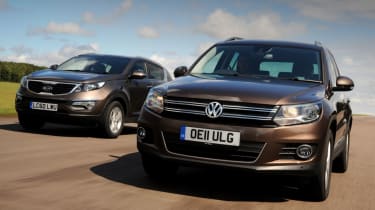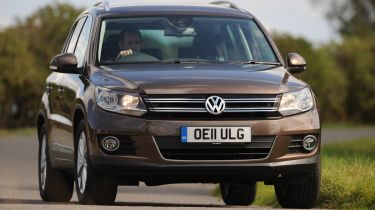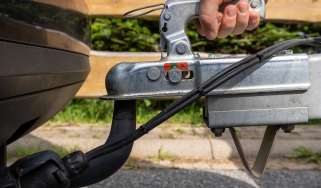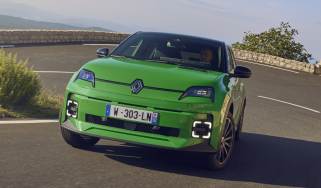Used Volkswagen Tiguan (Mk1, 2008-2016) review
The VW Tiguan is a popular alternative to the Skoda Yeti, with smart styling and a wide range of engines
Verdict
It’s not the most exciting car, but the Tiguan provides a generally painless ownership experience. We ran a 2.0 TDI for more than 15,000 miles and 12 months, and it proved a hit. Capable of over 40mpg (some owners get 50mpg-plus), the Tiguan impressed with its high-speed refinement, classy cabin and excellent practicality. But there are cheaper compact SUVs that are also fine used buys. Still, the VW is easy to recommend if you’re not heading off road; while it’s a talented car, it’s better when driven on the tarmac.
Which one should I buy?
- Best Volkswagen Tiguan for low costs: 1.4 TSI S
- Best Volkswagen Tiguan for fuel economy: 2.0 TDI Match BlueMotion Technology
- Best Volkswagen Tiguan for driving fun: 2.0 TSI R-Line
The Tiguan arrived in the UK in February 2008 with a choice of two engines and standard-fit four-wheel drive. Other engines and front-wheel drive arrived later, with the Tiguan treated to a facelift in 2011. A late 2.0-litre diesel in Match trim would be our choice of Tiguan.
Most Tiguans are diesels, and you want one of these if you’ll be towing; just ensure any purchase has had the diesel emissions fix carried out. But don’t overlook the petrol engines; they’re not too thirsty and cost less to service (even if road tax bills are higher).
More reviews
All examples come with alloys, ESP, climate control, powered windows all round, electrically adjustable mirrors and remote locking. SE/Match spec adds Bluetooth, parking sensors, tyre-pressure monitoring and a DAB radio, while Sport models have 18-inch wheels. R-Line Tiguans get 19-inch alloys, body styling and firmer suspension; check the ride is bearable before buying.
The factory-fitted integral hitch works brilliantly if you’re towing; other desirable options include a panoramic glass roof and DSG semi-automatic transmission, although the manual gearboxes are more durable.
What are the alternatives?
The market is awash with compact SUVs, and the Renault Kadjar was the highest-rated in our 2016 Driver Power satisfaction survey. But because the car only launched in 2015, prices start at £10,000.
The Subaru Forester (2012 on) was the next-best-ranked model, finishing eighth overall thanks to its reliability, build quality and practicality. Skoda’s Yeti came first or second in the survey five times in a row so it’s a brilliant all-rounder; it dropped to 16th in 2016.
For value it’s hard to beat the Ford Kuga, which is good to drive and in plentiful supply; Mazda’s CX-5 shares these attributes. Also consider the Honda CR-V, Hyundai ix35/Tucson, Kia Sportage, Nissan Qashqai and Toyota RAV4, which are fine choices.
Volkswagen Tiguan vs Kia Sportage

Rewind the clock to the winter of 2011, when we compared four-wheel-drive versions of the facelifted Volkswagen Tiguan to the Kia Sportage. At the time, the Sportage had yet to be beaten in an Auto Express road test, so the VW faced an uphill battle. It was another victory for the excellent-value Kia, although we did praise the VW’s quality and packaging. Read the full test...
Volkswagen Tiguan vs Land Rover Freelander vs Volvo XC60
Back in 2009, we tested the then-new Volvo XC60 DRIVe against two of its fiercest premium competitors: the Volkswagen Tiguan and Land Rover Freelander. We liked the Freelander’s off-road ability and the XC60’s low emissions, but the Tiguan took class honours thanks to its blend of efficiency, performance and quality. Read the full test...
Volkswagen Tiguan vs rivals
We almost need a time machine to revisit this test from 2009; some of the cars are looking seriously dated. The Vauxhall Antara has long since bitten the dust, while the current Toyota RAV4 and Honda CR-V look very different from the SUVs on show here. The then-new VW Tiguan was good enough to take second place, but the CR-V took overall victory. Read the full test...







